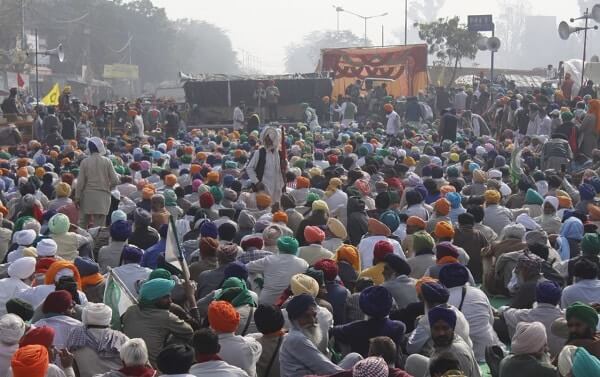As protests against three controversial agriculture laws gain momentum in India, many questions have been raised about the impact of these reforms. There’s growing concern that the new rules will allow corporates to exploit farmers and will leave them worse off than before.
As a result, India’s farmers have taken to the streets in one of the largest such protests in the last decade. As of 7 December, thousands of farmers are camped out on the outskirts on New Delhi after five rounds of discussion with the government remained inconclusive.
AT A GLANCE
- Farmers’ Produce Trade and Commerce (Promotion and Facilitation) Act, 2020 allows intra-state and inter-state trade beyond notified state markets, and prohibits state governments from levying fees or cess outside state market areas
- The Essential Commodities (Amendment) Act 2020 allows the central government to regulate the supply of essential food items like cereals, pulses, onions) only under extraordinary circumstances like war, famine and price rises
- Farmers (Empowerment and Protection) Agreement on Price Assurance and Farm Services Act, 2020 creates a framework for contract farming through prior agreement between a farmer and a buyer, and provides for a three-level dispute settlement mechanism if disagreements arises
The farmers are being increasingly joined by Indians across the diaspora, including here in Australia. Numerous demonstrations have already been held in the past week, including rallies at Quakers Hill in Sydney, City Hall in Brisbane, Federation Square in Melbourne, and in front of the Indian High Commission in Canberra.
Australian parliamentarians have also lent their support. Labor MP Rob Mitchell addressed his concerns on the treatment of Indian farmers in the Victorian parliament, insisting “dialogue is always better than violence”, while Labor’s Russell Wortley MLC joined a rally on the steps of the Parliament House.
An Australia-based specialist in the agriculture domain Professor Nanjappa Ashwath of the CQ University, explained how the laws change the existing system in India.
“With the current mandi (government regulated market) system, farmers take their produce to the market, where they display goods in an auction. It’s an open system where everyone gets a fair chance with a minimum support price (MSP) they are guaranteed.”

With the new rules, Indian farmers will be able to bypass mandis and produce directly for private businesses. The new rules will also remove prohibitions against hoarding, allowing buyers to stockpile produce.
The central government has said this will increase competition, opportunities, and investment for India’s farmers to help them achieve higher incomes. Prime Minister Narendra Modi has called the reforms “a watershed moment in the history of Indian agriculture.”
A watershed moment in the history of Indian agriculture! Congratulations to our hardworking farmers on the passage of key bills in Parliament, which will ensure a complete transformation of the agriculture sector as well as empower crores of farmers.
— Narendra Modi (@narendramodi) September 20, 2020
But according to the protesters, corporates with high bargaining power will be able to drive down prices, and these laws will pave the way to abolishing the minimum support price.
Now well into its eleventh day, there’s a lot at stake with the protests. Agriculture is the primary livelihood of almost 60 per cent of India’s population and the reforms affect many stakeholders, including commission agents at the mandis, and state government revenue.
“For the educated farmer, the changes can provide a good system. But who will look out for farmers who aren’t able to negotiate with corporates to get a good deal?” Prof. Ashwath asked.
Understandably, the situation is tense. Indian media outlets have already reported some violence between the police and protesters. Canadian Prime Minister Justin Trudeau commented on the unfolding incidents, calling the situation “very concerning.”
READ MORE: Dec 8 Bharat Bandh

In the UK, 36 cross-party MPs led by the Labour Party’s Tanmanjit Singh Dhesi have come out in support of the ongoing farmers’ agitation, asking British Foreign Secretary Dominic Raab to raise the matter with New Delhi. A protest at the Indian High Commission in London on 6 December saw 13 arrests for breaching COVID regulations.
As we go to print, the next round of talks between 40 farmer union leaders and the government is scheduled for 9 December, following a ‘Bharat Bandh’ call on 8 December. The farmers’ five-point charter of demands include a specific law on MSP, written assurance on MSP, no punishment for stubble-burning, repeal of the three farm laws, and settlement of objections about proposed Electricity (Amendment) Act.
READ MORE: On 11th day, Singhu protest site turns into ‘Mini Punjab’
“Farmers are the backbone of India. It’s crucial to encourage farming practices for future generations and ensure they are protected against companies. It’s also important to consider who is behind the protests, and why this is happening,” Prof. Ashwath said.
With farmers making up a huge voting bloc, supporters of the reform have said the protesters are being misled with incorrect information.
Amandeep Singh Sidhu, a community leader in the farming community of Woolgoolga NSW and a farmer himself, points out that much of the protest stems from ill-feeling that the government isn’t consulting the very people the reform impacts.
“The issue is the lack of consultation with farmers. In pushing these bills through parliament without discussion, there’s been no opportunity to study the laws,” he told Indian Link.

In September, the legislation was passed in the Rajya Sabha amid chaos, with the telecast of the proceedings being muted before eventually putting the Bills to a doubtful voice vote. While quick, the voice vote raised questions on the true majority voting in favour.
“It’s a problem when the government turns a deaf ear to protests, putting up barricades to stop citizens from going into their own capital city,” Singh elaborated.
While he believes the Acts work in theory, the inability to properly implement existing laws protecting farmers in India doesn’t inspire confidence.
“Current ordinances say that payments by the government must come within 21 days. But some farmers in states like Uttar Pradesh and Punjab have payments pending for 14 months or longer,” Singh observed.
“At the end of the day, companies are driven by shareholders and profits. For example, a farmer receives Rs 7 for a kilo of atta that is sold by a company for Rs 150 a kilo in India. What do you do about that difference to protect the farmer?”

These protests have raised much debate about supporting India’s agricultural sector and protecting farmers from corporate behemoths, amid numerous political elements at play.
Ahead of the next round of discussions on the demands to repeal the laws or guarantee MSP as a legal right, Singh muses on possible solutions to the impasse.
“Seeing the Australian model of corporates working with farmers, the laws make sense if communicated properly. I’d suggest pausing the Act to run an awareness campaign for farmers for a year before implementation,” he said.





